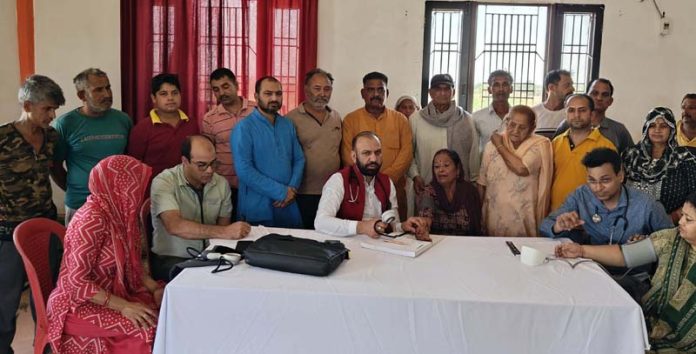Excelsior Correspondent
JAMMU, May 19: In view of rising incidence of cardiac ailments in rural areas particularly among women, Head Department of Cardiology GMCH Jammu Dr Sushil Sharma held a day long cardiac awareness-cum-health-Check up camp at Kanjak Devi Devsthan village Sultanpur, Tehsil Bishnah, Jammu with main focus on educating women about adopting cardiac friendly lifestyle and henceforth decreasing morbidity and mortality.
While interacting with the people, Dr Sushil stated that the cardiovascular health of individuals living in rural communities has long been noted to be worse than their more urban dwelling counterparts. There is a higher prevalence of having at least one chronic heart disease among rural individuals, 14.2% compared to 11.2% among small metropolitan residents and 9.9% among urban residents.
“In addition to more disease burden, rural individuals have higher cardiovascular death rates. Further, although the rates of cardiovascular death are declining, it is declining more rapidly among urban population. When looking a gender differences, the higher maternal mortality rate among rural women appears to be driven by an increase in cardiovascular death in the peripartum period. Possible explanations for the higher prevalence of angina in females may include gender differences in health perceptions or differential health-seeking behaviour or that these symptoms in females may not always indicate severe disease,” Dr Sharma said.
He elaborated that there are several factors that contribute to the increased risk of heart disease in women in India. One key factor is the high prevalence of risk factors such as high blood pressure, high cholesterol, and diabetes among women. The prevalence of diabetes in particular, appears to be higher in Indian women compared to women in other countries (approximately 12% versus the global average of 9% according to the Demographic and Health Surveys Program and International Diabetes Federation).
“It is important to note that diabetes is a complex condition influenced by various genetic, environmental, and lifestyle factors. Indian women often face unique challenges such as lack of physical activity, poor nutrition, and increased stress due to societal and cultural norms, which can contribute to the development of risk factors for heart disease. Additionally, hormonal changes during pregnancy and menopause can also impact a woman’s cardiovascular health. Conditions like diabetes during pregnancy (gestational diabetes), and hypertensive disorders during pregnancy (preeclampsia and gestational hypertension) can increase the risk of heart disease. The risk of heart disease in women increases significantly after menopause, and menopause at a young age is an additional risk factor for heart disease,” Dr Sharma said.
Others who were part of this humane effort included Dr Yashwant Sharma and Dr Dhaneshwar Kapoor. Paramedics and Volunteers who were part of the team included Kamal Sharma, Raghav Rajput, Rohit Nayyar, Rajinder Singh, Arun Singh, Jatin Bhasin, Rajkumar, Maninder Singh, Gourav Sharma , Vikas Kumar and Nirvair Singh Bali.


